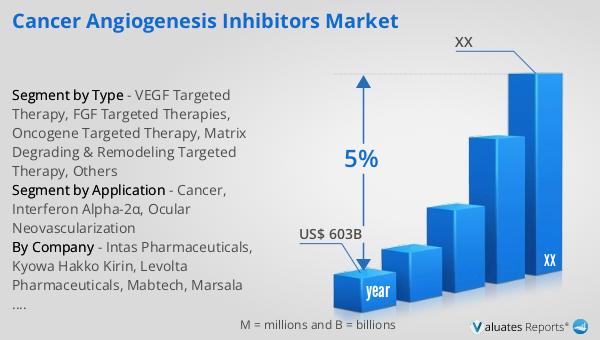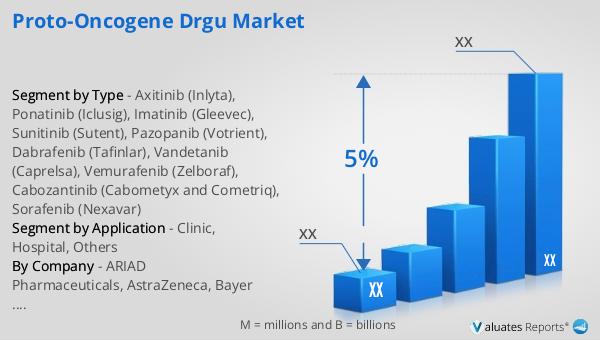What is Global Cancer Angiogenesis Inhibitors Market?
The Global Cancer Angiogenesis Inhibitors Market is a specialized segment within the broader pharmaceutical industry, focusing on the development and commercialization of drugs that inhibit angiogenesis, the process through which new blood vessels form from pre-existing ones. This process is crucial for tumor growth and metastasis, as cancer cells require a blood supply to receive nutrients and oxygen. Angiogenesis inhibitors work by blocking the signals that promote blood vessel formation, thereby starving the tumor and inhibiting its growth. These inhibitors are used in the treatment of various types of cancer, including lung, breast, colorectal, and kidney cancers. The market is driven by the increasing prevalence of cancer worldwide, advancements in biotechnology, and a growing understanding of the molecular mechanisms underlying angiogenesis. Additionally, the market is characterized by ongoing research and development activities, with numerous clinical trials underway to explore new therapeutic targets and improve the efficacy and safety profiles of existing treatments. The competitive landscape includes both established pharmaceutical companies and emerging biotech firms, all striving to develop innovative solutions to meet the unmet needs of cancer patients.

VEGF Targeted Therapy, FGF Targeted Therapies, Oncogene Targeted Therapy, Matrix Degrading & Remodeling Targeted Therapy, Others in the Global Cancer Angiogenesis Inhibitors Market:
VEGF Targeted Therapy is a cornerstone of the Global Cancer Angiogenesis Inhibitors Market. VEGF, or vascular endothelial growth factor, is a signal protein that stimulates the formation of blood vessels. In cancer, VEGF is often overexpressed, leading to increased angiogenesis and tumor growth. VEGF targeted therapies, such as bevacizumab, work by binding to VEGF and preventing it from interacting with its receptors on the surface of endothelial cells, thereby inhibiting the angiogenesis process. These therapies have been shown to be effective in treating various cancers, including colorectal, lung, and renal cell carcinoma. FGF Targeted Therapies focus on the fibroblast growth factor (FGF) family, which plays a significant role in angiogenesis, wound healing, and embryonic development. In cancer, FGFs can promote tumor growth and resistance to anti-VEGF therapies. FGF inhibitors aim to block these pathways, offering a potential treatment option for patients who do not respond to VEGF inhibitors. Oncogene Targeted Therapy involves targeting specific oncogenes that drive cancer progression. These therapies are designed to inhibit the activity of proteins encoded by oncogenes, thereby disrupting the signaling pathways that promote tumor growth and angiogenesis. Examples include inhibitors of the HER2/neu oncogene in breast cancer and the BCR-ABL oncogene in chronic myeloid leukemia. Matrix Degrading & Remodeling Targeted Therapy focuses on the extracellular matrix (ECM), a complex network of proteins and other molecules that provide structural support to tissues. In cancer, the ECM is often remodeled to facilitate tumor invasion and metastasis. Therapies targeting matrix metalloproteinases (MMPs), enzymes that degrade the ECM, aim to prevent this remodeling process and inhibit cancer progression. Other therapies in the Global Cancer Angiogenesis Inhibitors Market include those targeting integrins, which are cell surface receptors involved in cell adhesion and migration, and therapies targeting the angiopoietin/Tie2 pathway, which plays a critical role in blood vessel maturation and stability. These diverse therapeutic approaches reflect the complexity of angiogenesis and the need for multifaceted strategies to effectively combat cancer.
Cancer, Interferon Alpha-2α, Ocular Neovascularization in the Global Cancer Angiogenesis Inhibitors Market:
The Global Cancer Angiogenesis Inhibitors Market finds its application in several critical areas, including cancer treatment, interferon alpha-2α therapy, and ocular neovascularization. In cancer treatment, angiogenesis inhibitors are used to target the blood vessels that supply nutrients and oxygen to tumors. By inhibiting angiogenesis, these drugs can effectively starve the tumor, slowing its growth and reducing its ability to spread to other parts of the body. This approach is particularly beneficial in treating solid tumors, such as those found in the lungs, breasts, and kidneys. Angiogenesis inhibitors are often used in combination with other cancer therapies, such as chemotherapy and radiation, to enhance their efficacy and improve patient outcomes. Interferon alpha-2α is a type of cytokine therapy that has been used in the treatment of certain cancers and viral infections. It works by modulating the immune response and inhibiting angiogenesis. In the context of the Global Cancer Angiogenesis Inhibitors Market, interferon alpha-2α is used to treat conditions such as renal cell carcinoma and melanoma. By inhibiting angiogenesis, interferon alpha-2α can help to reduce tumor growth and improve survival rates in patients with these cancers. Ocular neovascularization is a condition characterized by the abnormal growth of blood vessels in the eye, which can lead to vision loss. This condition is commonly associated with diseases such as age-related macular degeneration (AMD) and diabetic retinopathy. Angiogenesis inhibitors, such as ranibizumab and aflibercept, are used to treat ocular neovascularization by targeting the VEGF pathway, which is a key driver of blood vessel growth in the eye. By inhibiting VEGF, these drugs can help to stabilize or improve vision in patients with these conditions. The use of angiogenesis inhibitors in ocular neovascularization highlights the versatility of these therapies and their potential to address a wide range of medical conditions beyond cancer.
Global Cancer Angiogenesis Inhibitors Market Outlook:
Based on our research, the global market for medical devices is projected to reach approximately $603 billion in 2023, with an anticipated growth rate of 5% annually over the next six years. This growth is driven by several factors, including technological advancements, an aging global population, and an increasing prevalence of chronic diseases. As healthcare systems worldwide strive to improve patient outcomes and reduce costs, there is a growing demand for innovative medical devices that can enhance diagnostic accuracy, improve treatment efficacy, and streamline healthcare delivery. The market encompasses a wide range of products, from diagnostic imaging equipment and surgical instruments to wearable health monitors and implantable devices. Companies operating in this space are investing heavily in research and development to bring new and improved products to market, while also exploring opportunities in emerging markets where healthcare infrastructure is rapidly developing. Additionally, regulatory changes and reimbursement policies are influencing market dynamics, as governments and healthcare providers seek to balance the need for innovation with cost containment. As a result, the medical device industry is poised for continued growth, with significant opportunities for companies that can navigate the complex regulatory landscape and deliver value to patients and healthcare providers alike.
| Report Metric | Details |
| Report Name | Cancer Angiogenesis Inhibitors Market |
| Accounted market size in year | US$ 603 billion |
| CAGR | 5% |
| Base Year | year |
| Segment by Type |
|
| Segment by Application |
|
| Consumption by Region |
|
| By Company | Intas Pharmaceuticals, Kyowa Hakko Kirin, Levolta Pharmaceuticals, Mabtech, Marsala Biotech, Neumedicines, Genentech, Five Prime Therapeutics, Fuji Film Kyowa Kirin Biologics, Genexine, Hetero Drugs, ImClone Systems, Novartis |
| Forecast units | USD million in value |
| Report coverage | Revenue and volume forecast, company share, competitive landscape, growth factors and trends |
